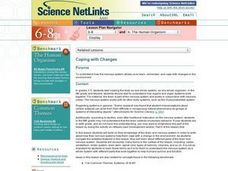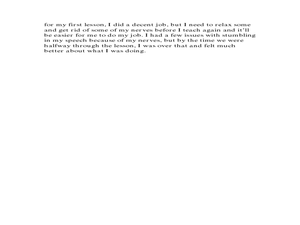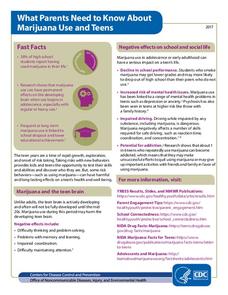Curated OER
Types of Behavior
In this behavior worksheet, students review the different types of behaviors including instinct, reflex, and learned behaviors. This worksheet has 10 terms in a crossword puzzle and 6 fill in the blank questions.
Curated OER
Coping with Changes
Learners build on knowledge of brain and nervous system in order to write about how their nervous systems help them cope with change in environment. Students navigate online sites to explore different parts of brain and nervous system.
Curated OER
Student Opinion: How Impulsive Are You?
Sure to spark lively discussion in any Language Arts classroom, this article from The York Times asks the question, 'How much self-control do you have?'. Pupils begin by reading a short passage about a study on delayed gratification and...
Missouri Department of Elementary
How Do I Act Like a Friend?
Familiar puppets set the stage for a thoughtful discussion about friendship. To show what they know, scholars role-play scenarios. Peers offer a thumbs up when they view positive character traits exhibit good friend behavior.
Curated OER
Mirror Image
Why does practice make perfect? Give your class insight into procedural memory, where we learn to do new things — then continue to improve through repetition. By attempting to draw shapes while looking in a mirror,...
Missouri Department of Elementary
Don’t Tease Me!
A whole-class discussion sheds light on school bullying and ways to prevent it. Scholars share a moment when they observed or experienced some sort of teasing. Pupils brainstorm ways such behavior can be stopped or prevented.
Curated OER
It's All in Your Mind
Students examine the brain. In this anatomy lesson, students engage in 2 activities that allow them to explore how to protect and optimize their brain health.
Curated OER
Thought Log: Correcting Harmful Thoughts
A thought log helps people track daily events, their (possibly harmful) internal reactions, and the consequences and behaviors they experience in response to their own thoughts. The last column of the chart provides space to conceive...
Curated OER
Latent Learning
Students discuss childhood psychology by viewing a YouTube video. In this human behavior activity, students identify latent learners and discuss reasons why some people fail to conform to society while others are quick to please everyone...
Curated OER
How Alzheimer's Affects the Brain
Young scholars study how Alzheimer's affects different parts of the brain, sketch a healthy neuron and its parts, and diagram brain changes during the early and late stages of Alzheimer's.
Curated OER
Behavior Adaptations
In this behavior instructional activity, students review different types of behavioral adaptations including migration, hibernation, and communication. This instructional activity has 10 matching and 10 true or false questions.
Florida Department of Health
Understanding the Risk of Substance Abuse Unit
Teenage brains are different! Understanding that the teenage brain is still developing and thus more impacted by substance abuse is the key concept in a three-lesson high school health unit. Participants learn about how the brain and...
University of Minnesota
What's the Deal? Addiction Card Game
Addiction is a big deal! Playing a game of cards helps learners understand the concept of addiction. Through their analysis, they examine the potential for addiction and how it varies for each individual.
Agriculture in the Classroom
Roll of the Genes
Animal reproduction in sheep and cattle is explored with the help of Punnet squares. Scholars employ tools using probability to conclude the color of wool a sheep's offspring will have. Acting as animal geneticists, pupils then take...
Curated OER
Pets: Oh Behave
Students develop an understanding of how innate and learned behaviors and the environment determine behavior. They see how a variety of factors affects our pet's behavior-including species-specific traits, the environment, training, and...
Curated OER
The Psychology Teacher's Resource Guide
The activities in a comprehensive teacher's resource guide provides budding psychologists with opportunities to design experiments to study behavior, apply their knowledge of research variables, critique online behavior surveys, and much...
Curated OER
Bird Brained?
Learners identify general abilities that indicate animal cognitive intelligence. In this biology activity, students create an intelligence testing challenge for ravens. They compare its ability to that of a crow.
Brain Parade
See.Touch.Learn.
Here is a great app that has tons of potential in helping your child or student with severe to moderate autism, or other intellectual disability, learn words and concepts using research-based methods. Children with autism or PDD NOS have...
Anti-Bullying Alliance
Anti-Bullying Lesson Plan
Wicked is not just a Tony Award winning broadway musical. It also makes for a strong base to teach character education, specifically anti-bullying. Scholars listen, discuss, role play, and show what they know through a group...
Curated OER
Dolphin Brains
Students listen to an interview with Lori Marino regarding the development of dolphin brains and read a summarizing text. They conduct further research and participate in class discussion.
Centers for Disease Control and Prevention
What Parents Need to Know About Marijuana Use and Teens
The teenage years find adolescents yearning for independence—and often isolating their parents from their everyday lives. Educate parents on the warning signs of marijuana use, including its effects on the brain and the likelihood of...
Green Education Foundation
How Loud is Too Loud?
Ever wonder how loud a sound has to be to cause damage? Young scientists explore sound properties by researching decibel levels. They discuss how sound is perceived by our ears and our brains and why it can cause negative health effects...
Curated OER
The Human Organism
Eighth graders investigate animal behavior by studying the lives of three female behavior scientists. For this human organism lesson students do different activities that inquire and approach each females work.
Curated OER
Teen and Decision Making
Young scholars examine how the brain develops. In this neurology lesson students read an article citing evidence that the different areas of the brain mature at different rates. They discuss emotional versus logical aspects of...

























